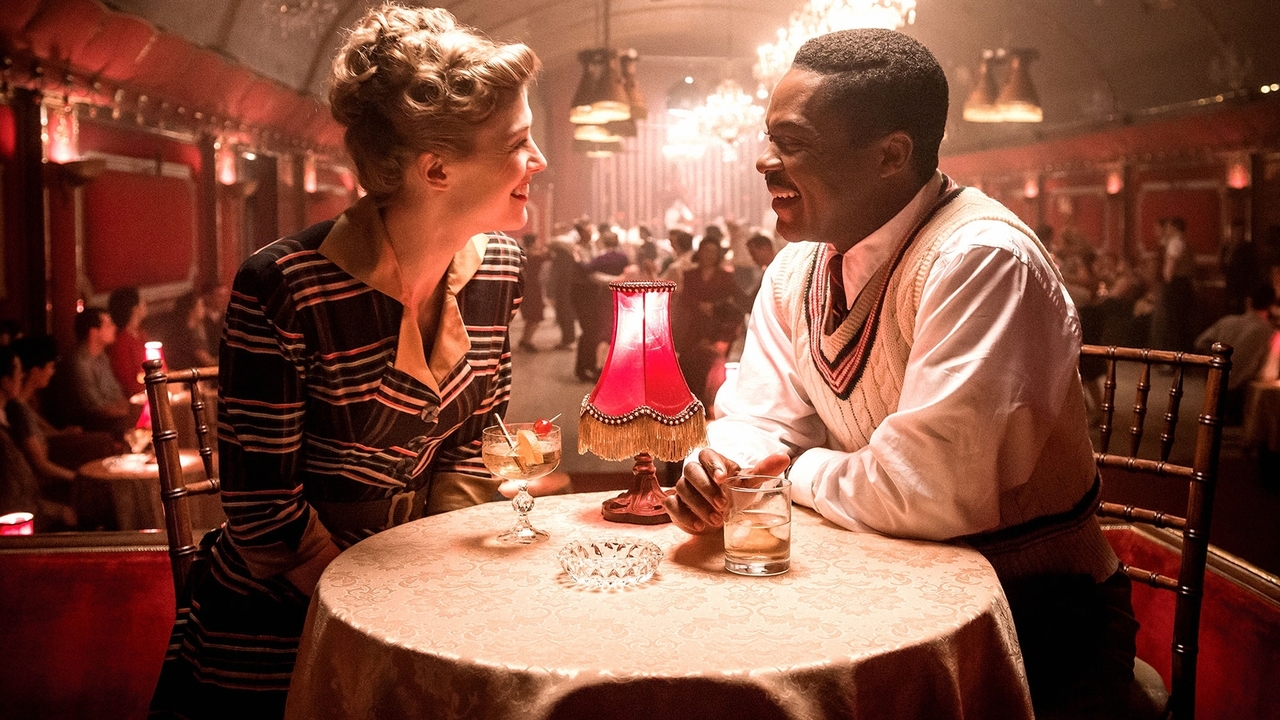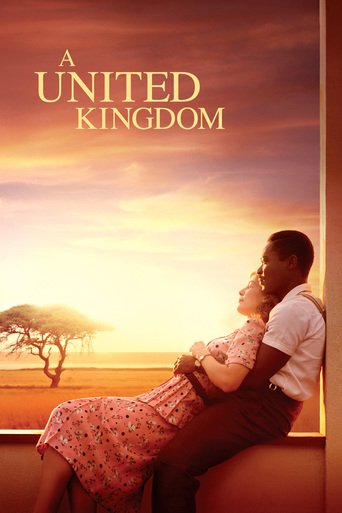

Seretse Khama, studying law in England as preparation for assuming his role as hereditary tribal chief in 1947 Bechuanaland, falls in love and marries a white English woman. This causes massive diplomatic problems, leading to the British government exiling him from his own country.This is a fairly straightforward dramatisation of a true story, set in post-war England and Africa. At a time when racial prejudice was still rife, mixed marriages were frowned upon generally and, given Khama's regal status in Bechuanaland (now Botswana), his marriage to a white commoner was unfavourably received in his own country. Yet this was almost insignificant next to the British reaction, where Ruth was more or less ordered by the government not to marry Seretse. And Ruth's father disowned her.The romance angle is more or less underplayed here. David Oyelowo and Rosamund Pike have sufficient chemistry for us to believe they are marrying for love, even though this seems to be entirely on the basis of two or three dances and Seretse having a punch-up with some racist thugs.And when they arrive in Africa they encounter more of the same, only in reverse. This leads to a schism between Seretse and his uncle which, in turns, provides grounds for the British government (Bechuanaland was a British protectorate at the time) to exile him.The film is very good at evoking the 1950-ish era, especially in England, and the sense of time and location work effectively.Oyelowo and Pike do well as the fraught lovers, Tom Felton continues to impress in character parts, and Jack Davenport is brilliant as a supremely confident civil servant. Nicholas Lyndhurst is very un-Rodney-ish as Ruth's father.Very often, this sort of film is so concerned with the significance of the points it is making that it forgets to be entertaining (Idris Elba's Mandela movie comes to mind). But director Amma Asante follows up her previous movie Belle with a film which has something important to say, and which says it in an engaging, and sometimes moving, way.This left me feeling uplifted even though it, very conspicuously, did not leave me feeling proud to be British.
... View MoreMy wife and I enjoyed this movie much, we watched it at home on DVD from our public library.The events depicted here are all factual, starting in 1947 and continuing into the 1950s. David Oyelowo, who was so good in "Selma" as MLK, is Seretse Khama, on track to become King of his small African country. He is completing his education in England when he meets his eventual wife, Rosamund Pike as Ruth Williams, a clerk at Lloyd's of London. About a year later they married.Most of the movie deals with the outfall from that marriage. Back in the homeland Khama's people, initially opposed to this white woman to become their Queen, eventually accepted her. But the big problem was being a British Protectorate, the British government prevented this from going forward because they needed S. Africa who objected strongly and at the time was establishing apartheid. So Khama was exiled.The story does end well, not all of this covered in the movie, public pressure on the British helped, and in 1966 Khama became the 1st President of Botswana, serving in that role until his death in 1980 at the age of 59. Today his eldest son, Ian, is the 4th President of Botswana.Good story, good movie!
... View MoreI knew so little about this slice of history and understand this could have much to do with the British government not being overly keen on talking too much about it. Although, as events turned out, it was support from the British public that had much to do with a better than average outcome. Based on factual events and beautifully photographed this movie has been somewhat neglected - as might be expected - for its lack of any explosions and action scenes. Those looking for an intelligent historical love story that involves King Seretes of Botswana and the white English woman he falls in love with, won't be let down by this uncommonly polished approach to storytelling.The early British scenes that make up the first half seemed a bit episodic but, this could have been in order to set up the characters for the serious testing that society and political institutions were about to meter out - across both hemispheres - on the principal couple. Some of the British officials also tend to be treated in an overly stiff-upper-lip- fashion but then, especially at this time (1940s-1950s), there existed a greater class divide so, much of this could be quite accurate. Most performances are first class (David Oyelowo especially) and Patrick Doyle's lush music score is an asset. Some may find elements of the screenplay a bit staid but it remains a treat for discerning audiences.
... View MoreThis was an amazing story of what happened! They did a fantastic job filming this and showing the story. I loved how they showed the scenery and the beautiful land that this took place in as well as the unjust done to this family and their people. I loved seeing the people come together and welcome, protect and thank a woman whom they did not want originally. This is a beautiful story of how love overcomes injustice, racism and political manipulation.
... View More